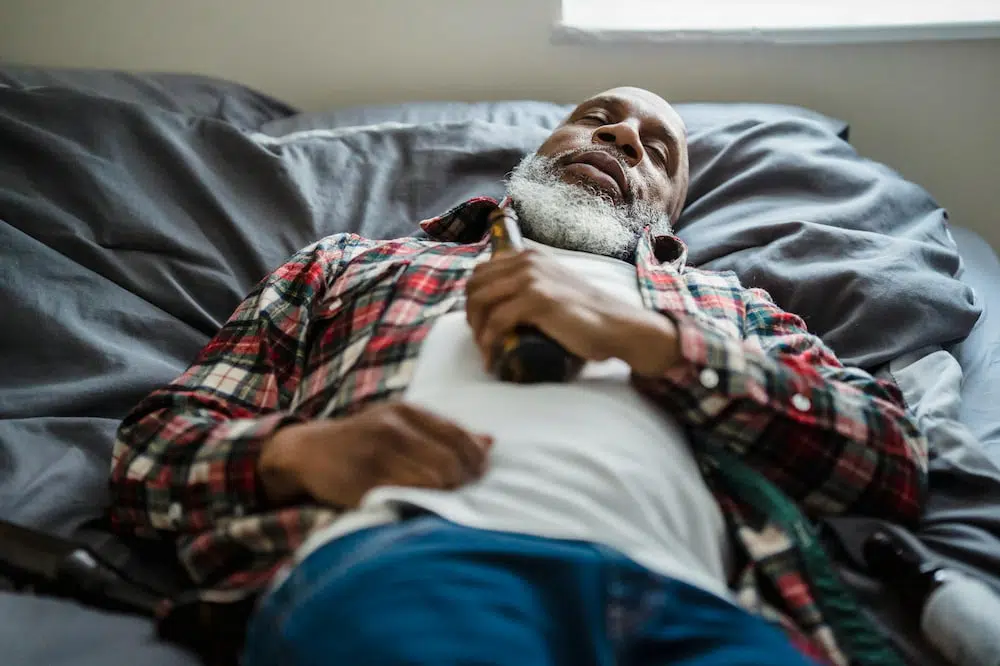
Alcoholism And Sleep Apnea: Unraveling The Deep-Rooted Connection
Many people enjoy a drink now and then. But when drinking becomes a regular thing, it can lead to alcoholism. Did you know that heavy drinking can also affect your sleep?
There’s a deep connection between alcoholism and sleep apnea. Sleep apnea is when you stop breathing for short periods while you sleep. It can make you feel tired during the day and has other health risks.
When you mix alcohol with this sleep problem, things can get even more complicated. Let’s dive into this topic and learn more about the link between these two.
The Connection Between Alcoholism And Sleep Apnea
Scientific Research Findings
Scientists have done a lot of studies on this topic. They found that people who drink alcohol often have sleep problems.
Some of these problems include sleep apnea. Sleep apnea is when a person stops breathing for a short time while they are sleeping.
How Alcohol Worsens Sleep Apnea
Alcohol relaxes the muscles in our bodies. This includes the muscles in our throat. When these muscles get too relaxed, they can block the airway.
This makes it hard for people to breathe when they sleep. So, if someone already has sleep apnea, drinking alcohol can worsen it.
Impact Of Sleep Apnea On Alcoholism
Now, let’s flip it. People with sleep apnea often feel exhausted during the day. They might drink alcohol to feel better or to help them sleep.
But this can be tricky. While alcohol might initially make them sleepy, it can worsen their sleep in the long run. This can lead them to drink more and more, leading to alcoholism.
Mutual Exacerbation Of Symptoms
The bad thing is that alcoholism and sleep apnea worsen each other. A person who drinks a lot can have worse sleep apnea. And a person with bad sleep apnea might drink more. It’s a cycle that keeps going.
Coordinated Care And Treatment
The good news is that doctors know about this connection. When they treat someone for alcoholism, they also check for sleep apnea.
And when they treat someone for sleep apnea, they ask about drinking. By doing this, they can give the best care and help break the cycle.
Factors Contributing To The Link
Depressant Effects Of Alcohol
Alcohol acts like a depressant. That means it slows down the brain and the body. When people drink alcohol, their brain relaxes more than usual. This can cause problems with breathing when they sleep.
It makes it hard for the body to signal the need for more air. So, the person might stop breathing for a short time or breathe very slowly. This is one-way alcohol can lead to sleep apnea.
Influence On Airway Muscles
When people drink alcohol, it affects their muscles. The muscles in the throat can become too relaxed.
When this happens, the airway narrows or closes. It makes it hard to breathe. This is a big reason why people who drink a lot might snore loudly or have sleep apnea.
Sleep Disruptions And Snoring
Alcohol changes the way we sleep. People who drink might fall asleep fast, but their sleep is not deep or restful. They can wake up many times during the night.
Also, because of the relaxed muscles in the throat, they might snore a lot. Loud snoring can be a sign of sleep apnea.
Metabolic And Hormonal Changes
Drinking alcohol changes the body in many ways. It affects how our body uses energy and makes hormones.
These changes can disrupt sleep patterns. Over time, this can lead to sleep problems, including sleep apnea.
Genetic Predisposition
Some people have genes that make them more likely to have sleep apnea. These genes can also make them more likely to drink alcohol.
So, if someone in your family has alcoholism and sleep apnea, you might also be at a higher risk.
Health Consequences And Complications
Cardiovascular Implications
Drinking a lot of alcohol hurts the heart. People who drink too much can get high blood pressure. Over time, this makes the heart work harder. This extra work can lead to bigger heart problems.
At the same time, sleep apnea causes people to stop breathing for short times while they sleep. This also makes the heart work harder. So, having both alcoholism and sleep apnea can harm the heart.
Cognitive And Emotional Effects
Both alcohol and not sleeping well can make people feel tired and confused. Over time, drinking too much and having sleep apnea can make it hard for people to think clearly.
It can also make people feel sad or anxious. This mix of feelings and confusion is because of the link between alcoholism and sleep apnea.
Risk Of Accidents And Injuries
When people feel tired and confused, they can get hurt more easily. They might fall or have a car crash.
Drinking too much can also make people take risks they wouldn’t usually take. So, the chances of getting hurt increase when someone drinks a lot and has sleep problems.
Quality Of Life
Everyone wants to feel good and be happy. But drinking too much and not sleeping well can make this hard. People might feel sick a lot.
They might not enjoy things they used to love. They might have trouble with friends and family. This all affects how good life feels.
Breaking The Cycle Of Addiction
It’s hard to stop drinking when it becomes a habit. However, knowing about the connection between alcoholism and sleep apnea can help.
When people see how these problems are linked, they might want to get help. Some doctors and groups can help people drink less and sleep better. It’s a step toward a healthier life.
Diagnosis And Treatment Options
Diagnosing Alcoholism
Doctors can tell if someone has a problem with alcohol by asking questions. They ask how often a person drinks, how much they drink, and if drinking causes problems. Doctors sometimes use blood tests to see if alcohol harms the body.
Diagnosing Sleep Apnea
Doctors usually do a sleep study to determine if someone has sleep apnea.
In a sleep study, a person sleeps in a special room while machines watch their breathing. They may have sleep apnea if they stop breathing a lot while they sleep.
Treatment Options For Alcoholism
When someone wants to stop drinking, there are many ways to help. Some people join groups that talk about not drinking.
Others see therapists who help them understand why they drink. And some people take medicine that makes them not want to drink.
Treatment Options For Sleep Apnea
Doctors often suggest ways to keep air moving smoothly for sleep apnea, such as oral medical devices and/or PAP machines, so the patient breathes better at night.
Coordinated Care By Healthcare Professionals
When someone has both alcoholism and sleep apnea, doctors need to work together.
They talk to each other and make a plan. This plan helps the person get better from both problems simultaneously.
FAQs
1. Can Alcoholism Cause Sleep Apnea?
Alcoholism can exacerbate sleep apnea. Excessive alcohol relaxes throat muscles, increasing airway obstruction risk during sleep. This worsens sleep apnea symptoms and hinders overall sleep quality.
2. Can Quitting Alcohol Stop Sleep Apnea?
Quitting alcohol can alleviate sleep apnea symptoms in some cases. It can improve sleep quality and reduce apnea events, especially for those with alcohol-related sleep apnea triggers.
3. What Happens If You Drink Alcohol With Sleep Apnea?
Drinking alcohol with sleep apnea can worsen the condition. Alcohol relaxes throat muscles, increasing the risk of airway blockage during sleep. This can lead to more frequent and severe apnea episodes, compromising the quality of rest and overall health.
Conclusion
Understanding the link between alcoholism and sleep apnea is essential. When people know how these two problems connect, they can get the right help.
With good care from doctors and other experts, people can sleep better and live without too much alcohol.
Remember, it’s always best to ask for help when facing issues with alcohol and sleeping. The earlier you understand the connection between alcoholism and sleep apnea, the sooner you can find a path to health and happiness.



